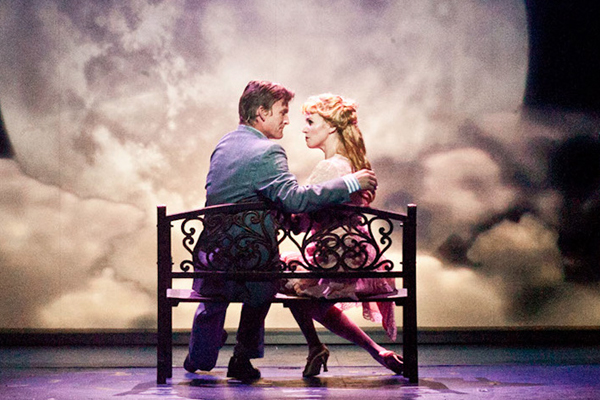F. Scott Fitzgerald owned America in the ‘20s. His first book,This Side of Paradise, was a hit, and though his aim with the public was by no means sure, there were enough popular successes to keep him and his high-upkeep wife, Zelda, on the society page throughout the decade. Then, as now, the glamor, booze and public crack-ups obscured the talent, which was unequaled. Fitzgerald described a deep American sadness, which prevails even in the face of privilege, in prose at once luscious and fiercely to the point.
As a stylist his only rivals are Faulkner and Hemingway, and his tenderness and compassion are qualities missing in both those titans. Zelda Fitzgerald was a multi-but-not-deeply talented Southern girl who landed the golden boy from Princeton, and rode his wave until it sank them both. Who suffered most at the hand of the other is still a matter of conjecture. They were glamor and talent and sadness, and America is still waiting for their like to appear again.
Unfortunately, neither of those characters shows up in Flat Rock’s Zelda. Instead, we have a throng of attractive actors hitting their marks and seldom going flat and flashing their expensive smiles. Characterization is clear-cut and sustained all the way to the back row of the chorus. Some, like Broadway-caliber dancer Julius Anthony Rubio, have that extra radiance and presence of the star. Both leads, Jarrod Emick as Scott and Lauren Kennedy as Zelda, are fully up to the task set before them. They end their scenes either with a blast of well-trained lung power or with a Hollywood kiss, dancers swirling to either side. Everyone is good. It is all very professional.
And that is precisely the problem. I was contemplating the concept “professionalism” all through the show, trying to figure out how the production could be at once so good and so bad. Everyone was doing everything they should. The set and tech were nothing less than sensational. All was … professional. But professionalism is not content; it is a manner of conveyance. It is a delivery system. And, at the end of the evening, it was clear there hadn’t been much to convey. The rockets were mighty but there was no payload. The dishes were silver but there was no food. Zelda is not so much a musical as a diagram of how “professionals” put a musical together, cutting and pasting — if you’ve seen TV’s Smash you’ve seen a more Uptown version of it — punching up here, dumbing down there, until you have a machine, recognizable, but in no sense alive. Zelda dwells exactly at that point where the balance between art and industry goes fatally askew.
Two songs, “He Doesn’t Have It Anymore” and “Losing the Light” have clever lyrics. I smiled listening to them, they were so “right.” But Frank Wildhorn’s music — despite his Broadway pedigree — is instantly forgettable. At a few moments it looked like the book might evolve some kind of surprise or significance. Scott in Hollywood, Zelda and the reporter in Highland Hospital provided a line or two, an extended moment of real theater, dangerous and promising.
But the moments passed, and we were back again in a fully recognizable, generic Broadway Show, not as good as most, yet every tweak-able moment tweaked, every ambiguity blasted away by tinsel or fortissimo high notes, every inroad by emotional truth thwarted. The worst was the last, for after a perfectly plausible and emotionally genuine ending, they poured out cheese at least a foot thick, a posthumous “happy ending” so inharmonious and false that every member of the audience should have felt insulted. You know someone said to someone else, “But a real professional leaves them feeling good.” Unlike, you know, life.
It wasn’t even Scott and Zelda’s story. For the most part, you could substitute the names “John” and “Mary” and tell the same story of a rocky marriage and a sad end and nobody would know the difference. I bet the team of Wildhorn and Murphy have done, or are contemplating doing, exactly that.
Nevertheless, I joined the reflexive standing ovation at the end. Yes, I was in a hurry to get to my car, but before that I wanted to honor the efforts of cast, crew, designers, whose skills and professionalism (in a better sense) disguise the unnourishing meal they have been made to serve up. Is it possible for a theater to have too much money? Perhaps. Maybe if they hadn’t been able to rely on so much technical razzle-dazzle, someone would have said to someone else, “Let’s not do this show. There’s really nothing here.”




I am commenting anonymously – cowardly, I know, but it’s such a small town, and we all know each other.
It’s funny – although I agree with Hopes’ conclusion, I totally disagree with his reasoning. The musical is limp, lifeless and meandering. But it’s nonsense to say that it’s because it’s too “professional.”
You could argue that the director cast the wrong professional actors – or that the professional actors were not served by the director they were stuck with.
You could also argue that the writing was so terrible that no director or actor could have polished this turd.
I would argue all of the above, in fact. It saddens me to see a beloved local institution like Flat Rock Playhouse used as an incubator for some wannabe Broadway producer.
There, I’m done. No more anonymous vitriol.